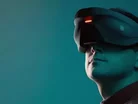PwC: Snapshot of the future with VR/AR technology

Immersive technologies, from virtual reality (VR) to augmented reality (AR), is forecast to enjoy a global GDP boost of US$1.5 trillion by 2030, reports PricewaterhouseCoopers (PwC).
Outlined in their economic impact report, Seeing is Believing, PwC have analysed the adoption of these technologies within the UK to provide a micro perspective on their value to business.
“We’ve found engineering, manufacturing and retail organisations to be the most vocal about their use of immersive technologies,” said Jeremy Dalton, PwC UK Head of VR/AR.
“This makes sense when you consider that many manufacturers have been using such technologies since the early 2000s and retailers are keen to promote their investment in these technologies as a means of creating deeper connections with their customers.”
Research methodology
Consultants, PwC, researched publicly available information on 2.2 million UK organisations, looking for examples of VR/AR use.
“After analysing 500 million points of data using a natural language processing (NLP) tool, our map has been populated based on examples we’ve identified via websites, press releases, social media messages and other public sources,” outlines the report.
The interactive map allows you to visualise VR/AR adoption by:
- Technology – VR/AR usage
- Geography – Where VR/AR are being used across the UK
- Industry – Which industries are adopting VR/AR
- Application – Where organisations are using VR/AR
According to the research London is leading the way across all channels in VR/AR usage with statistics showing an adoption of all technologies was 32.16% for VR and 35.09% for AR.
Top three applications:
Retail and customer engagement – 37.87%
Learning and development – 21.68%
Entertainment and leisure – 12/32%
Top three industries:
Engineering and manufacturing – 24.13%
Retail and consumer – 10.90%
Professional services – 10.65%
According to case studies polled by PwC, the investment and development of immersive technologies is proving beneficial.
“We've created a fun AR game that highlights to our customers the good, wholesome foods that go into each of our products.” Commented a north-west based retailer.
“We’ve developed a VR tool aiming to engage pension scheme members to help them understand what impact their decisions (or lack of) might have on their quality of later life,” said London based professional services company.
For more information on business topics in Europe, Middle East and Africa please take a look at the latest edition of Business Chief EMEA.



